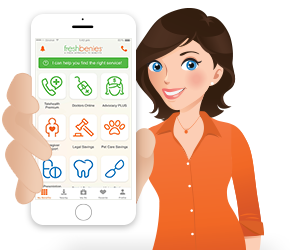SAVING ON HEALTHCARE - 3 TIPS FROM AN EXPERT
Do random people ask you personal questions about their healthcare? I’ve worked in the benefits consulting industry – specifically, health insurance, for 25+ years – so, I get it a lot!
Since I have some experience that might be helpful, below are my 3 tips for saving on your healthcare costs…
1. Ask Questions
So many times we take what health experts tell us and make decisions just on that information without research or questioning. We think the medical experts tell us everything what we need to know, but this is the time to ask for details - just like you would for any other paid service. It’s even more important because it involves your health and your dollars, both of which are precious to us all!
Why is it important to ask questions? It’s estimated that 30% of medical care in the US is unnecessary or wasted. None of us want to be part of that statistic.
When given a diagnosis, you need to know exactly when, where, how, who, and what to determine next steps. Asking questions now will prevent mistakes and misunderstandings later on.
Here are some ideas I’ve found helpful personally and professionally…
• Do research online – there are tons of websites available to answer questions about medical conditions, diagnoses, and treatments.
• Read materials provided at your doctor’s office.
• Get a second opinion. You’d do it for some work on your car or when buying a computer and your health is so much more important.
• Talk to your local pharmacist and read your medication paperwork for the details when you’ve been given a new prescription.
• Talk to the medical office staff about charges, billing and payment requirements before a major procedure.
• Consider a health advocacy program that provides an independent expert to help you navigate through questions about your health, as well as the “business side” of healthcare – insurance, bills, coverage, etc. They can also help with options for second opinions.
2. Compare Costs
How often do you think to ask about costs when it comes to healthcare? We usually just do what we’re told by our doctor. But, when it comes to making decisions about care, it’s important to compare costs. Why? It’s been found that prices can vary up to 500% between healthcare providers for the same procedure, in the same network, and within the same zip code. For instance, a knee replacement can have as much as a $10,000 difference for just hospital costs (not including physician fees, labs, rehab, etc.). Emergency room visits also can have huge cost disparities.
The point is to compare prices when shopping for health services just as you would do for any other services you pay for. Here are some ideas that I’ve found helpful personally and professionally…
• Ask for cost details on your procedure from the medical facility you’re considering. Find out the exact name of the procedure and how it’s referred to in the healthcare world. Each procedure has a HCPCS or CPT code – if you have that information, getting pricing information is easier.
• Then, review medical apps such as Health Advocate that provide a ballpark price for your location on common procedures.
• Contact your health insurance customer service department to confirm what services are covered and to help locate in-network providers.
• Review your health insurance company’s tools. They provide online cost estimates of frequently used services. Some also provide hospital quality details and comparisons.
• Compare medication costs at several pharmacies to determine the best savings. Pricing differs greatly by location and chain. Generic meds can save hundreds, as can discount programs. Click here for other ideas on prescription savings.
• Did I mention a health advocacy program? They can also provide an independent expert to help find prices on procedures in your local area. This article tells the story of someone who used this type of service to find pricing on some common procedures.
3. Check your health stats
What have you done for yourself lately when it comes to your health? There are so many preventive care measures you can now take to keep yourself healthy. Did you know there were over 20 preventive care additions to coverage just for women and children in recent years due to Health Care Reform requirements?
It definitely pays to get and stay healthy - especially when some of the services are at no or low cost!
• Establish a relationship with a primary doctor. It’s important to have one doctor who knows you, your personality, your body, your medical history, your overall health, etc. Your primary doctor will review your health history and determine what testing or screening is right for you.
• Get your annual physical and other preventive care based on your age, gender, family and health history. Most of these services are covered, so there’s little or no cost when you use a network provider.
• Get a screening - there are screenings for depression, colorectal cancer, diabetes, etc. If you or your doctor thinks you may have family history or a looming health issue, it pays to get those screenings.
• Research community programs available for conditions such as diabetes and high blood pressure, or to help you stop smoking. For example, YMCA’s Diabetes Prevention Program helps with dietary guides, discussions, coaching, and materials. In my city, there has been great success with members actively participating and then lowering risks with the proper education and training.
• Check with your health insurance company for health education resources. Some offer programs, interactive tools, and coaching at no cost to improve your health.
After years in the industry, here’s what I know: most people think they don’t have time for these steps. My experience says you can’t afford NOT to take these simple steps to improve your health and health care.
Now, it’s your turn! Do you need to save on your healthcare costs? Have you tried any of these tips? What tips do you have? Comment and share!
















